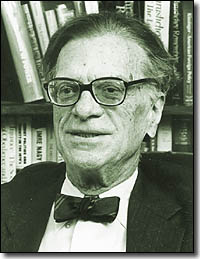Adam Ulam, Authority on Russia, Dies at 77

Adam Ulam, the Gurney Professor of History and Political Science Emeritus, died on March 28 after a lengthy illness. He was 77.
Ulam was one of the world’s foremost authorities on Russia and the Soviet Union. He was a member of the Harvard faculty from 1947 until his retirement in 1992. Over the years, he trained thousands of undergraduate and graduate students, including many who went on to high-level posts in academia, government, business, and the media. Among his students were Robert Kennedy and Henry Kissinger.
Ulam was affiliated with Harvard’s Russian Research Center (renamed the Davis Center for Russian Studies in 1997) for more than 50 years. He twice served as the Center’s director, from 1973 to 1976 and from 1980 to 1992. During his tenure, the Center became one of the leading institutions in the world for the study of the Soviet Union.
Marshall Goldman, associate director of the Davis Center, described Ulam as “a Renaissance man who knew and had heard of and had thought about everything. If you wanted to know something, rather than go to a reference librarian, you would go to Adam.”
Henry Rosovsky, the Lewis P. and Linda L. Geyser University Professor Emeritus, said: “Adam Ulam was an old-fashioned professor in the best sense of the word. The life of the mind was his primary occupation. Research and students were his main concerns. The Russian Research Center was his home quite literally for many decades. He really was one of the giants in a rich generation of refugee scholars, most of whom alas are gone.”
Edward Keenan, the Andrew W. Mellon Professor of History and Director of the Dumbarton Oaks Research Library and Collection, described Ulam as “a gentle, playful Galician cosmopolite, a prodigious reader and
enormously fluent writer. A narrative historian by inclination and
practice, he was somewhat out of place in a department he thought to be
increasingly influenced by vaporous abstractions and models. We all loved
him.”
Harvey Mansfield, the William R. Kenan Jr. Professor of Government, called Ulam “a man of strong views who was also capable of dispassionate analysis and was respected on all sides. He stayed out of politics except on one occasion when he expressed his disgust with student rebels and faculty cowards in the late ’60s in a book called The Fall of the University. He loved companionship and he loved wit and was a master of it.”
Ulam was born on April 8, 1922, in what was then Lwów, Poland, now part of Ukraine. He emigrated to the United States in 1939, accompanied by his older brother, Stanislaw. The two brothers made it out of the country just two weeks before Germany attacked Poland.
Stanislaw became one of the most eminent mathematicians and physicists of the 20th century and played a crucial role in the development of the thermonuclear bomb. Despite a 13-year age difference, the two brothers maintained an exceptionally close relationship until Stanislaw’s death in 1984. Their experiences together are recounted in Stanislaw’s autobiography, The Adventures of a Mathematician, and in Adam’s own memoirs, now available on the Internet (http://www.aulam.org).
Ulam became a naturalized citizen of the United States in 1949. By that point he had completed his undergraduate studies at Brown University (1943) and his doctoral degree at Harvard (1947). In 1947 he joined the Harvard faculty and in 1959 he became a full professor in the Government Department. He was a long-time associate of Eliot House and a member of the Universitys Signet Society.
Ulam wrote 18 books, many of which remain classics in the field. He started out in 1951 by publishing a book titled The Philosophical Foundations of English Socialism and followed it up a year later with Titoism and the Cominform.
After that, Ulam began writing about Russia and the Soviet Union, a focus he maintained for the rest of his life. His study The Bolsheviks (1965) is still regarded as one of the definitive treatments of the Communist Party under the leadership of Vladimir Lenin. The book was hailed by reviewers as “an intellectual biography of the highest sort,” a “stunningly insightful look at this key period,” and a “masterful study of the Communists’ rise to power in Russia.”
Ulam’s 760-page biography of Josef Stalin, Stalin: The Man and His Era, met similar acclaim when it was published in 1973. Reviewers described it as a “mammoth and altogether splendid volume,” “an absorbing study of power won and terrifyingly applied,” a “superb biography of Stalin,” and a book that is “morally as well as historically definitive.”
Ulam’s magisterial survey of Soviet foreign policy, Expansion and Coexistence, published in 1967, is often regarded as the most influential book on the subject ever to appear. Through several editions and reprintings, it was a standard text for courses on Soviet foreign policy and is still widely used. Ulam wrote a sequel to it, Dangerous Relations, in the early 1980s. The two books together cover Soviet foreign policy to the rise of Mikhail Gorbachev. Ulam never published a booklength study of Gorbachev’s foreign policy, but he did cover the subject in his final book, The Communists (1992).
Ulam won many awards for his research, including a Guggenheim Fellowship in 1956, Rockefeller Fellowships in 1957 and 1960, and a lifetime distinguished achievement award from the American Association for the Advancement of Slavic Studies in 1987. He also received an honorary doctorate from Brown University in 1983. He was a member of the American Academy of Arts and Sciences and of the American Philosophical Society.
Ulam is survived by his former wife, Mary Burgwin Ulam, and by his two sons, Alexander Stanislaw Ulam and Joseph Howard Ulam. The Ulams were divorced in 1992 but had spent much time together during Professor Ulams illness and were planning to remarry. A memorial service will be held in the Memorial Church on May 31 at 3:00 p.m.




